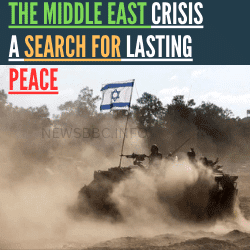Introduction
The ongoing crisis in the Middle East, with its roots deep in historical conflicts, poses significant challenges to international peace and stability. Terrorism in all its forms is unequivocally condemnable. The recent surge in violence, particularly between Hamas and Israel, has shed light on the dire consequences of conflict and oppression. It is imperative to delve deeper into this multifaceted issue, exploring its historical context, the evolving geopolitical dynamics, and the urgent need for a sustainable resolution. In this comprehensive article, we will analyze the Middle East Crisis in great detail, providing a comprehensive overview of the situation and offering potential paths to peace.
A State Versus Non-State Conflict:
The Complex Dynamics of Middle East Crisis
The ongoing conflict between Hamas, a non-state actor, and Israel, a recognized nation-state, raises critical questions about state obligations and the use of military power. Unlike non-state actors, states such as Israel are held to higher standards of accountability under international law. The use of military force, particularly when it results in civilian casualties, is an issue that demands careful scrutiny.
Forced Evictions in Northern Gaza:
A Grave Violation of Human Rights in Middle East Crisis
Israel’s policy of forced evictions in the northern part of the Gaza Strip has drawn widespread international condemnation. This policy, often masked as reprisals, serves to further entrench Israel’s occupation of the area. The humanitarian consequences are dire, with shortages of food, fuel, and water creating a crisis of epic proportions. The international community must respond with urgency to address the plight of the affected population.
A History of Palestinian Oppression:
The Weight of Generations
The Palestinian people have endured over half a century of relentless repression, living in what has been described as the ‘world’s largest open-air prison.’ Numerous ‘nakbas’ and forced expulsions have resulted from state-sponsored violence, deeply ingraining a sense of dispossession and despair among Palestinians. The current crisis, with Israel’s apparent intent to resolve the situation through a brutal ground invasion, raises concerns about a ‘final solution’ that has echoes of historical atrocities.
Also visit:Ukraine War 16 Killed in Missile Attack on Market Town
Challenges to International Law and Order:
The Erosion of Universal Norms
The normalization of actions that contravene international law poses a significant threat to global stability. When universal rights are not upheld consistently, the legitimacy of international law is eroded. The situations in Kashmir and Palestine, two of the oldest disputes on the UN’s docket, challenge the world’s commitment to applying universal norms. This deviation from established norms jeopardizes global order and stability.
The Wider Implications of Middle East Crisis:
Beyond the Middle East Crisis
The Middle East crisis not only threatens regional stability but also has profound global repercussions. Diplomatic and military dynamics are evolving rapidly, with the media playing a pivotal role in shaping public perception. The situation highlights the importance of containing not just military conflicts but also the narratives surrounding them.
Complex Narratives in Middle East Crisis:
The Role of Media and Public Opinion
The media’s portrayal of the conflict is multifaceted. While the Israeli military’s actions in the region often escape Western media scrutiny, there is widespread outrage in the Muslim world. The conflict is viewed as a response to Israel’s prolonged occupation of Palestinian lands. The historical context plays a crucial role in shaping public opinion, and as the crisis unfolds, the narrative becomes increasingly complex.
Historical Roots of the Conflict in Middle East Crisis:
A Long Journey of Struggles in Middle East Crisis
The conflict between Israelis and Palestinians has deep historical roots, with arbitrary post-World War I maps and a League of Nations mandate contributing to the tensions. The unresolved dispute over territory and rights has fueled multiple wars and prolonged suffering for the Palestinian people. To understand the present, we must reflect on the past and the decisions that have led to the current crisis.
The Path to Peace:
An Urgent Imperative of Middle East Crisis
In the current Gaza crisis, civilians, including women and children, are enduring a brutal blockade. The international community must condemn the inhumane siege imposed by the Israeli Defense Forces. Achieving peace requires both immediate ceasefires and long-term solutions. A roadmap to peace must consider the aspirations and rights of both Israelis and Palestinians.
A Challenging Diplomatic Landscape in Middle East Crisis:
Geopolitical Complexities
The geopolitical landscape complicates the pursuit of peace. While some countries express solidarity with the Palestinian people and advocate for a two-state solution, others maintain strong support for Israel. The role of key players, like the United States and Saudi Arabia, is crucial in finding a diplomatic resolution. The intricate web of alliances, interests, and power dynamics adds layers of complexity to the peace process.
The Urgent Need for Peace in Middle East Crisis:
Humanitarian Imperative
Ceasefires and diplomatic efforts are essential to halt the cycle of violence. However, sustainable peace in the Middle East can only be achieved through direct involvement of Israelis and Palestinians. Their collective memory of dispossession, death, and deprivation demands a just, inclusive peace as the only way forward. The world must focus on addressing this urgent, existential challenge in the 21st century.
Conclusion:
A Call for Global Action in Middle East Crisis
The Middle East crisis is a complex and multifaceted issue that requires international attention and concerted efforts for resolution. It is not just a regional conflict but a global concern, with far-reaching implications for peace and stability. As we reflect on the historical context, analyze the current dynamics, and acknowledge the urgency of achieving lasting peace, the international community must come together to pave the way for a better future for the Middle East and the world. It is our moral duty to address this crisis with unwavering commitment to justice, peace, and the protection of human rights.

